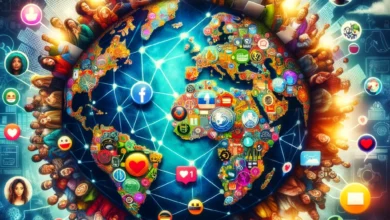Unraveling the Code: Why Millennials and Gen-Z Should Jump On The Coding Bandwagon
Digital Alchemy: From Novice to Coding Ninja in the Modern Age

Welcome, digital pioneers of the Millennial and Gen-Z generations! Are you ready to embark on an exhilarating journey into the realm of coding? In this digital era, where technology shapes our daily lives, coding has emerged as a crucial skill – no longer confined to tech aficionados but a vital tool for anyone looking to make a mark in the modern world. Whether you’re starting your coding adventure or looking to elevate your tech game, this guide is your launchpad to mastering the art of coding.
What’s Coding All About?
Think of coding as the secret language of computers, the magic behind every click, swipe, and tap. It’s the creative process of writing instructions that computers follow to perform tasks, solve problems, and bring ideas to life. Coding is the backbone of websites, apps, and software – it’s what makes your favorite social media platform so engaging, your go-to productivity app so efficient, and the latest video games so immersive.
Coding is like assembling a puzzle where each line of code is a piece that fits into a larger picture. When combined, these pieces create functional, interactive experiences that can inform, entertain, and inspire. From designing stunning websites to developing life-changing applications, coding is the force that turns abstract concepts into tangible realities.
In a world where technology is rapidly advancing, coding skills have become invaluable. They open doors to a plethora of opportunities, from tech-centric careers to roles where technological proficiency is a significant advantage. For Millennials and Gen-Z, who are digital natives, coding is not just a skill but a language of their era – one that offers endless possibilities for innovation, creativity, and problem-solving.
So, why should you jump on the coding bandwagon? The reasons are compelling:
- Future-Proof Your Career: In an increasingly automated world, coding skills ensure that you stay relevant and competitive in the job market.
- Empowerment Through Technology: Coding empowers you to build solutions to real-world problems, launch your startups, or bring your unique app ideas to life.
- Enhance Creativity and Logic: Coding is a perfect blend of creativity and logical thinking. It sharpens your problem-solving skills and encourages innovative thinking.
- Global Opportunities: The demand for coding skills is global, opening up opportunities to work with international teams, remote jobs, and cross-border projects.
- Community and Collaboration: The coding community is vast and supportive, offering endless resources, mentorship opportunities, and collaboration on projects.
As you set foot into this fascinating world, remember that coding is a journey of continuous learning and exploration. Every line of code you write is a step toward mastering this vital skill of the 21st century. So, let’s dive in and transform those ideas into digital masterpieces. Welcome to the world of coding – where imagination meets innovation! 🌐
Trending Programming Languages You Gotta Know
In the vast universe of coding, certain programming languages shine brighter, making them essential for any aspiring coder. Here’s a rundown of the languages that are ruling the digital world:
JavaScript: The Dynamic Web Artisan JavaScript is like the digital artist of the web, bringing static pages to life with interactive and dynamic content. From creating responsive web interfaces to powering complex web applications, JavaScript is a must-know for modern web development. It’s not just limited to the front end; thanks to Node.js, JavaScript has extended its reach to the server side, making it a full-stack powerhouse.
Python: The Versatile Powerhouse Python is the go-to language for its simplicity and readability, ideal for beginners to grasp the fundamentals of programming. But don’t let its simplicity fool you – Python is a robust language used in diverse fields like web development, data analysis, artificial intelligence, and scientific computing. With its vast libraries and frameworks, Python is akin to a Swiss Army knife, adaptable to any coding task you throw at it.
Java: The Universal Soldier Java’s motto could be ‘write once, run anywhere,’ thanks to its platform-independent nature. It’s the driving force behind countless Android apps and enterprise-level applications. With its strong emphasis on Object-Oriented Programming (OOP), Java is perfect for building scalable, maintainable applications. Whether you’re eyeing mobile app development or corporate software solutions, Java is a language you can’t afford to skip.
C#: The Game Developer’s Dream C# (pronounced ‘C-Sharp’) is the cornerstone of the Microsoft .NET framework and is particularly famous for its role in game development with the Unity engine. Beyond gaming, it’s also used for developing Windows applications, making it a versatile tool in a coder’s arsenal. C# combines the power and efficiency of C++ with the simplicity of Visual Basic, striking a balance that appeals to a wide range of developers.
Ruby: The Web Developer’s Best Friend Ruby, particularly when coupled with the Rails framework (aka Ruby on Rails), is a favorite for quickly developing web applications. It’s valued for its elegant syntax that’s easy to write and read. Ruby on Rails has been the framework behind many high-traffic websites due to its efficiency and the speed with which developers can go from concept to launch.
Mastering these languages opens a world of opportunities:
- JavaScript equips you to join the ranks of front-end developers, shaping the user experience of websites.
- Python is your ticket to the realms of machine learning, data science, and back-end development.
- Java offers a path to becoming an Android developer or enterprise software engineer.
- C# invites you into the exciting world of game development or desktop software creation.
- Ruby is ideal for those aspiring to become full-stack developers, especially in startup environments.
In the coding world, these languages are akin to superpowers. Each has its unique strengths and applications, making them valuable tools in your journey from coding novice to digital alchemy ninja. 🚀👨💻
Cracking The Code – Tips for Newbies
Welcome, digital adventurers! Are you eager to dive into the coding universe? Here’s your essential guide to begin your coding journey with confidence and creativity. Follow these tips to transition from a coding novice to a tech-savvy ninja in no time.
Back to Basics: Building a Strong Foundation
- Start with the absolute fundamentals of coding. Think of it as laying the groundwork for a towering skyscraper. Master basic syntax, understand how loops work, and get comfortable with conditionals.
- Example: Begin with simple coding exercises in Python or JavaScript, such as creating a program that calculates the sum of two numbers or prints a customized greeting based on user input.
Practice Makes Perfect: Coding as a Daily Habit
- Make coding a part of your daily routine. Tackle small, manageable projects regularly to build your coding muscles, just like a marathon runner trains every day.
- Example: Set a goal to code for at least 30 minutes daily. Start with basic projects like a to-do list app or a temperature converter and gradually increase the complexity.
Simplify Challenges: Breaking Down Complex Problems
- Approach complex coding problems by breaking them into smaller, more manageable tasks. This method is akin to solving a puzzle, one piece at a time, making it less overwhelming.
- Example: If you’re building a website, start by outlining its basic structure before diving into more intricate features like user authentication or database connectivity.
Build Something Real: From Theory to Action
- Apply your coding skills to real-world projects. This is where your theoretical knowledge comes to life. Start with simple, practical applications and gradually scale up.
- Example: Create a personal blog using HTML, CSS, and JavaScript. As you grow more comfortable, add features like user comments or a search function.
Join the Community: Networking and Collaboration
- Engage with the coding community. Participate in forums, contribute to open-source projects, or join coding meetups. These platforms offer invaluable opportunities for learning, sharing, and networking.
- Example: Join platforms like GitHub to contribute to open-source projects or Stack Overflow to ask questions and learn from experienced coders. Attend local coding bootcamps or workshops to network and gain insights.
By embracing these tips, you’re setting the stage for a fulfilling coding journey. Remember, every expert coder was once a beginner.
Coding 101 – Mastering Essential Commands
Embark on your coding journey by mastering these foundational commands, the building blocks for any budding coder. Let’s break down these key elements, ensuring you have the tools to start crafting your digital creations.
Print Statement: Your Code’s First Words
- The print statement is the most basic yet essential command. It’s how your code communicates with you. Like a baby’s first words, your first “Hello, World!” program using a print statement marks the beginning of your coding adventure.
- Example: In Python,
print("Hello, World!")displays the text on the screen, a simple yet powerful demonstration of output in coding.
Variables: The Flexible Storage Units
- Variables are like labeled boxes where you can store various types of data. They can hold numbers, text, lists, and more, making them versatile and essential in coding.
- Example: Create a variable to store a user’s name
userName = "Alice"and then use the print statement to display it:print(userName).
Conditional Statements: The Decision Makers
- Conditional statements allow your code to make decisions. Using ‘if’, ‘else’, and ‘elif’, your program can execute different code blocks based on certain conditions.
- Example:
if temperature > 30: print("It's a hot day!") else: print("It's not too hot today.")– This code decides what to print based on the temperature.
Loops: Automate the Repetitive
- Loops, such as ‘for’ and ‘while’, make your code efficient by repeating tasks without manual input. They’re perfect for tasks that need repetition until a condition is met.
- Example:
for i in range(5): print(i)– This loop will print numbers from 0 to 4. It repeats the print statement five times, automating the repetition.
Functions: The Reusable Code Blocks
- Functions are like your coding toolkit’s Swiss Army knife. You define a set of instructions once, and you can use them repeatedly throughout your code.
- Example: Define a function to greet a user:
def greet(name): print("Hello " + name + "!"). Whenever you need to greet someone, just callgreet("Alice").
Understanding and utilizing these basic commands is the first step in your coding journey. As you grow more confident with these tools, you’ll find that they form the foundation of even the most complex programs. Keep practicing, and soon you’ll be weaving these commands into intricate and functional code masterpieces.
Coding Hacks for Digital Alchemists
As you journey through the realms of coding, here are some hacks to enhance your coding prowess and make your development process smoother and more effective. Each of these strategies is like a secret spell in the grand wizardry of coding, giving you an edge in this fascinating digital quest.
Commenting: The Art of Leaving Clues
- Commenting your code is akin to leaving a trail of breadcrumbs or a detailed map. It’s not just for others who may tread the same path later, but also for you to retrace your steps when you return to a project after some time.
- Example: Use comments to annotate complex logic or tricky parts of your code. In Python, adding
# This function sorts the listabove a sorting function makes your code more readable and maintainable.
Showcasing on GitHub and CodePen: Your Digital Portfolio
- Think of platforms like GitHub and CodePen as the art galleries for your code. Here, you can exhibit your projects, collaborate with other coders, and draw inspiration from the community.
- Example: Upload your personal projects on GitHub, share snippets on CodePen, and actively participate in open-source projects. This not only builds your portfolio but also exposes you to diverse coding styles and techniques.
Utilizing Libraries and Frameworks: The Coders’ Shortcut
- Libraries and frameworks are like the enchanted tools of the coding world. They provide pre-written code snippets and structural blueprints that save you time and effort, allowing you to focus on the unique aspects of your projects.
- Example: Use React for building interactive UIs or Bootstrap for quick, responsive web designs. Leveraging these tools can significantly speed up development and ensure best practices.
Coding – Your Gateway to Digital Mastery
As you embrace the world of coding, remember it’s not just a technical skill; it’s a creative journey. Each line of code you write is a step towards transforming your imagination into reality. Whether it’s crafting a simple app, automating a task, or building the next big tech innovation, coding is your key to unlocking a world of possibilities.
In this digital age, where technology shapes our lives more than ever, coding is an invaluable skill for millennials and Gen-Z. It opens doors to exciting careers, fuels personal projects, and even serves as a fun hobby that challenges the mind. As you progress, remember that every expert coder was once a beginner. Stay curious, be patient with your learning curve, and, most importantly, enjoy the process of becoming a digital alchemist.
So, ready to code your dreams into reality? The world of digital alchemy awaits you. Happy coding, future ninjas of the tech world! 🚀👩💻🌟




